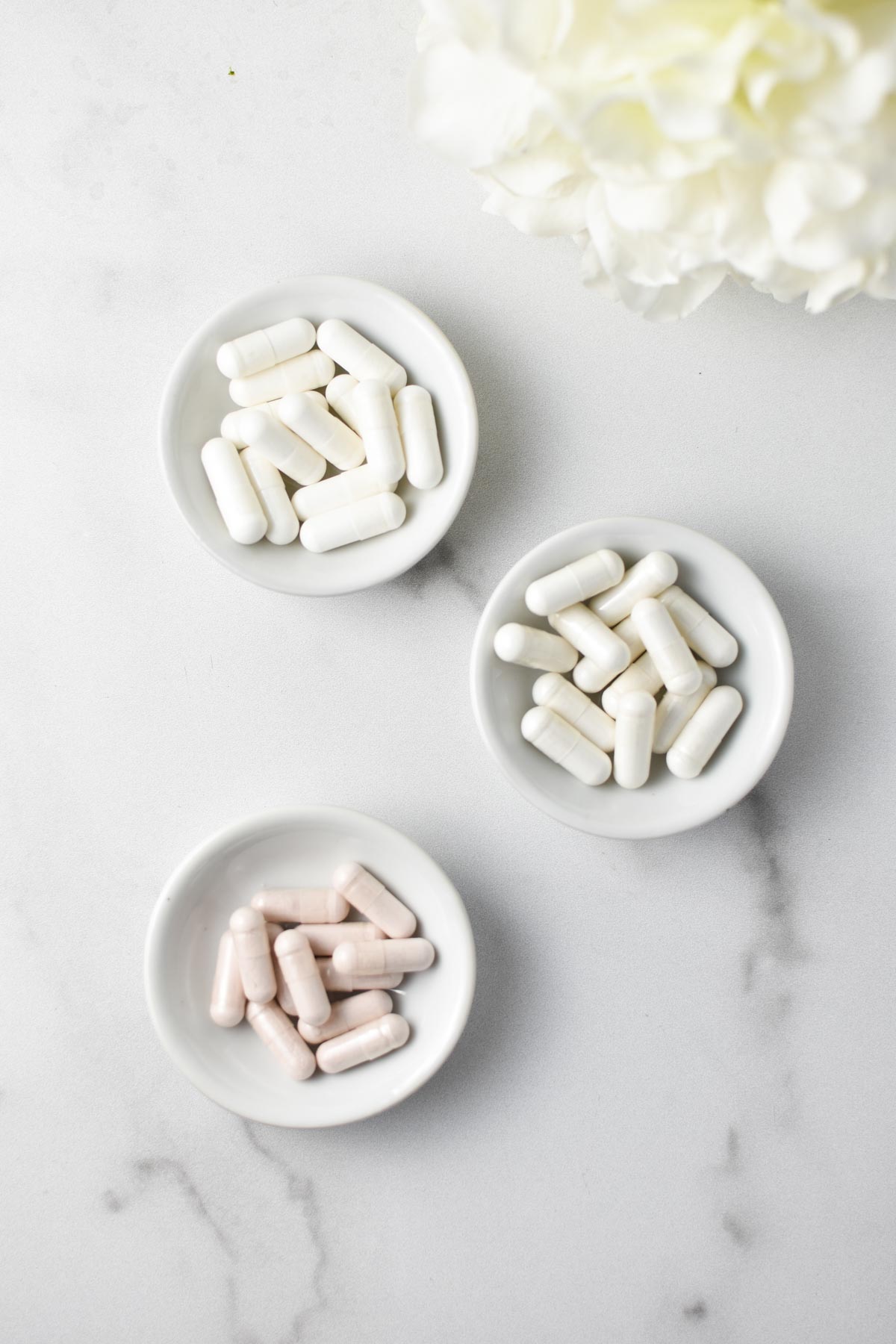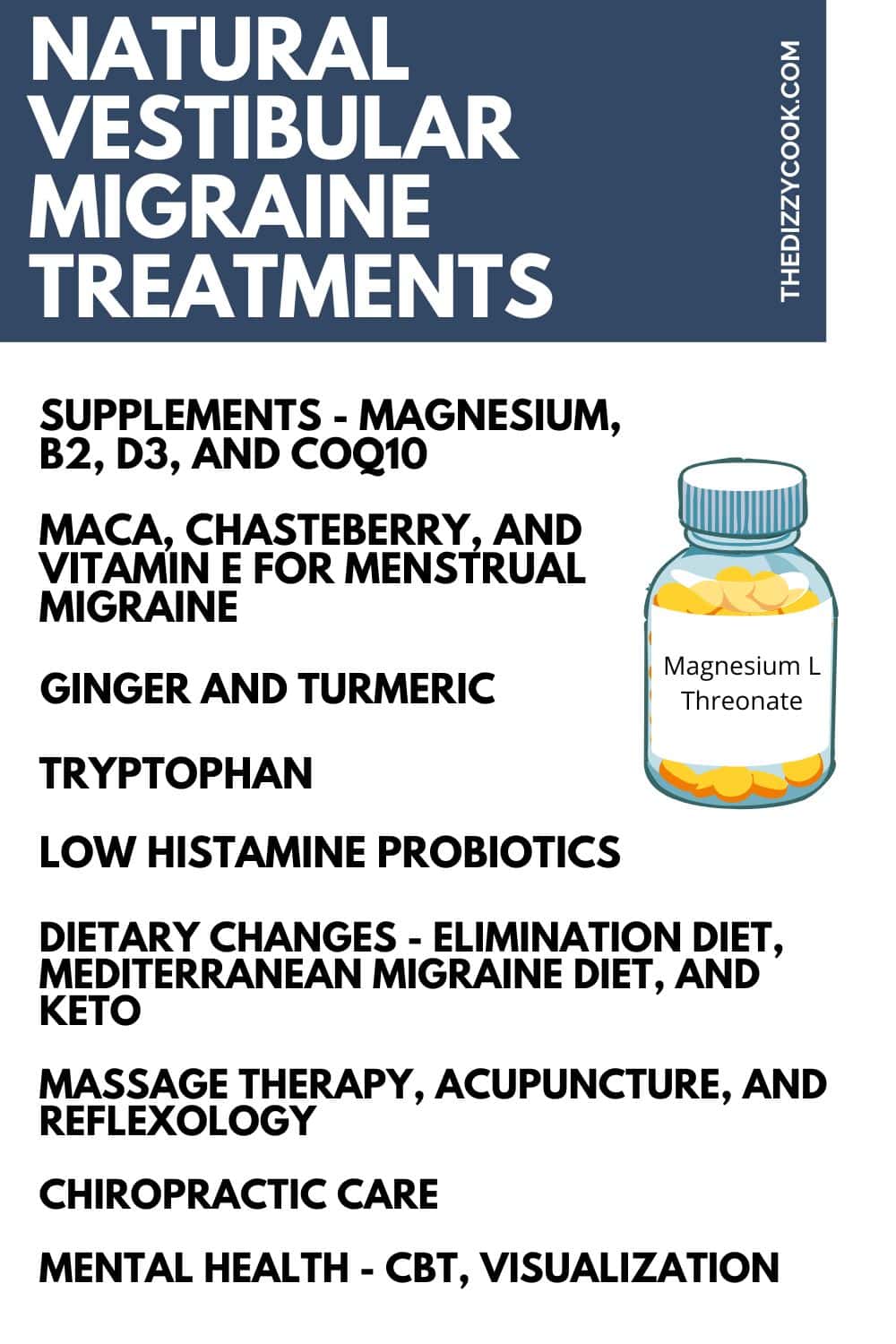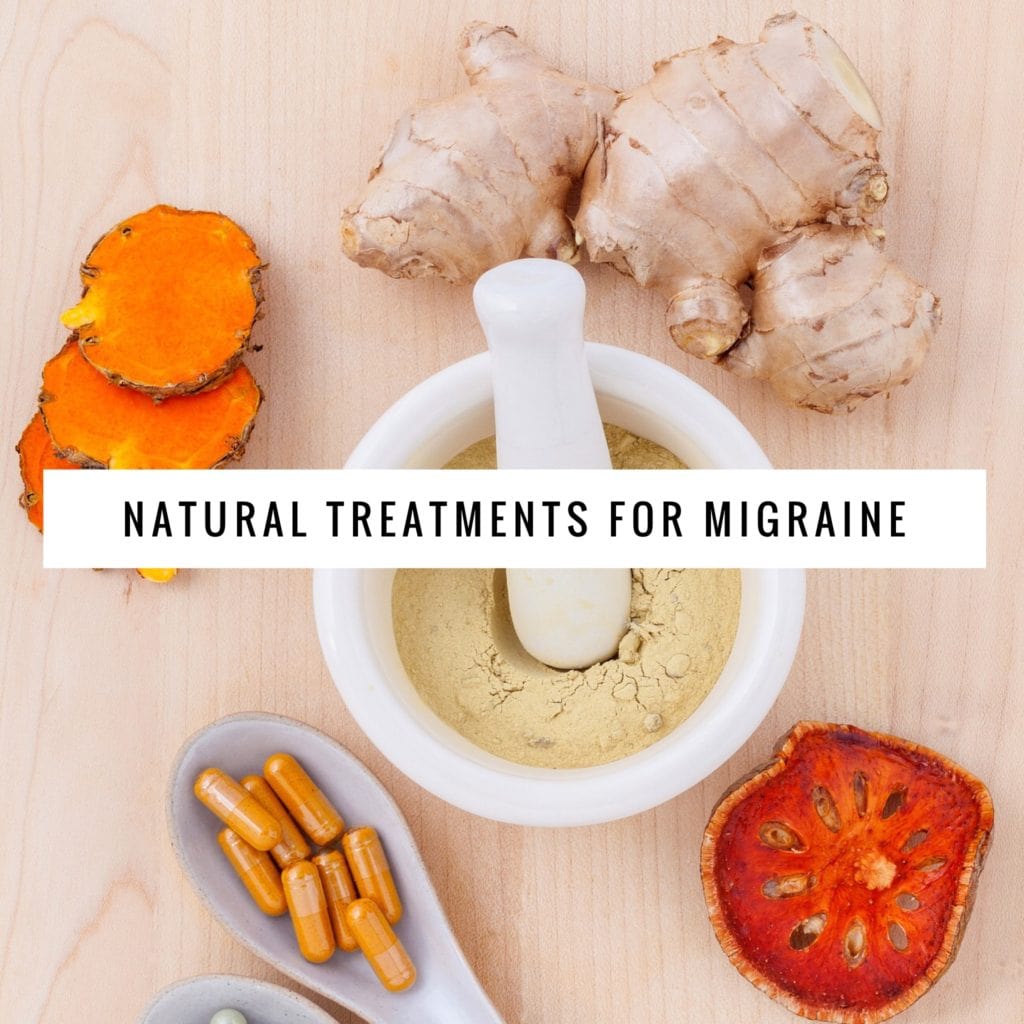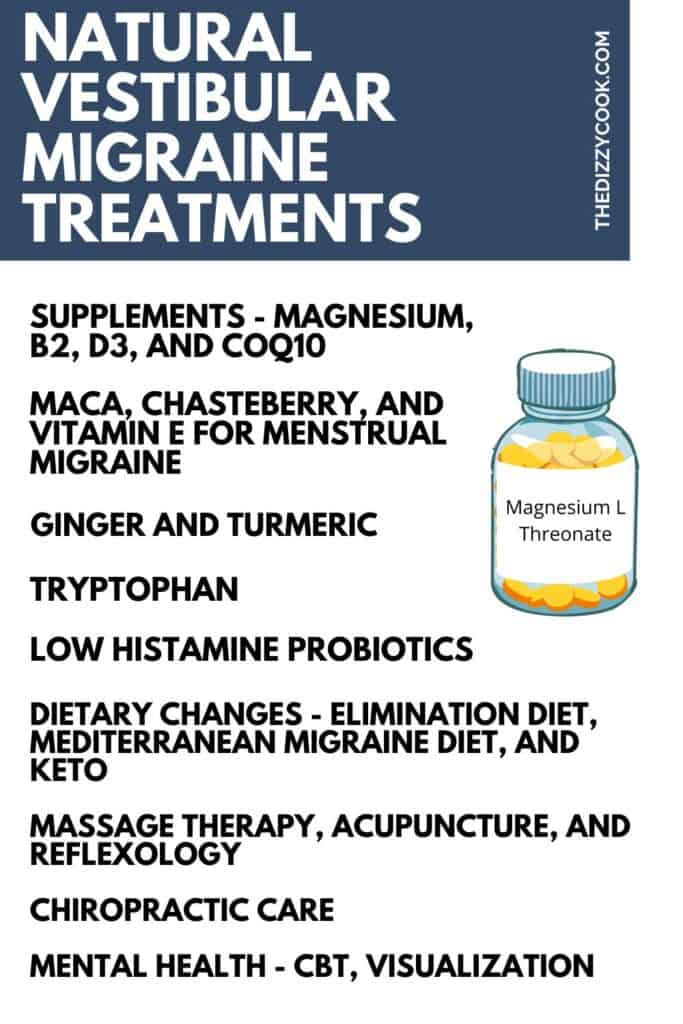Natural treatments for vestibular migraine can help bring down the severity of vertigo, dizziness, and light sensitivity. Often they work best when accompanied by medications, but for some people, the natural treatments are enough.
These are a few migraine prevention vitamins and treatments that have helped me over the years. A lot of these natural remedies for migraine associated vertigo and other vestibular migraine symptoms have been a part of my vestibular migraine story, even if I don't currently take some of them. This post is always changing depending on new treatments I'm discovering and testing myself.
Please always consult your doctor before taking any supplement. This is not meant to be a substitute for medical advice.
Jump to:
- Vestibular Migraine Supplements
- Advantages of Individual Supplements
- Magnesium for Migraine Relief
- Riboflavin for Migraine Prevention
- CoQ10 and Ubiquinol
- Maca and Vitamin E for Menstrual Migraine
- Vitamin D Deficiency and Migraine
- Ginger and Turmeric for Pain
- Tryptophan for Anxiety and Sleep
- Probiotics for Migraine
- Other Natural Treatments for Vestibular Migraine
- Multivitamins and Prenatal Vitamins
Vestibular Migraine Supplements
When I originally wrote this post at the beginning of creating The Dizzy Cook almost 5 years ago, I was at the edge of wanting to start a family. The thought of having a baby when you're dealing with chronic migraine can be overwhelming, but I also didn't want to give up on that dream. Because I knew it would be difficult to start a medication I might have to wean off of quickly due to pregnancy, I pressed my neurologist to focus on a vestibular migraine treatment plan that would have a focus on things I could continue during pregnancy and postpartum.
If you're also trying to get pregnant, the plan can depend on the severity of your migraine attacks. You should discuss with your OB-GYN the risks of medicating while pregnant. Mine was very open about the risk, but for some of her patients that experience life-threatening conditions like seizures, it’s important for their own health to continue medication. For me, the best option was to only use acute treatments at certain times, but to rely heavily on natural remedies for vestibular migraine.
I’ve been incredibly lucky that I’ve done well without using a lot of medication for the majority of my migraine treatment (outside of my preventative timolol malate eye drops). Even the weaning process off medication wasn’t horrible, although I did experience some pretty significant side effects from coming off of birth control. It was tough for a month or two, but eventually evened out back to a good baseline. I really buckled down on the supplements below and the HYH diet during that time.

Advantages of Individual Supplements
I used to take Migrelief, which was a combination of magnesium oxide and citrate, CoQ10, and B2, the most highly recommended migraine cocktail. For some reason (probably the expense of CoQ10), they quit carrying that version and only carry the kind with Feverfew. I tried it and it gave me headaches, so I had to switch to taking everything separately. That ended up being the best for me.
Some doctors say it's best to take supplements separately as combination supplements can have more fillers and less expensive ingredients. One of our family friends who is a popular rheumatologist has said it's significantly more effective to take individual supplements over combined pills.
Finally, with individual supplements you can add and take away to actually see what's helping. There's no point in just taking supplements if they're not actually helping...unless you like expensive pee!
Magnesium for Migraine Relief

There are a few other magnesium types that are great for magnesium deficiency and chronic illness. Malate is said to be good for people with fibromyalgia or CFS. For people taking high doses, magnesium glycinate is really great since it is bonded to the amino acid glycine as opposed to citrate which is bonded to citric acid.
Glycine itself supports digestive and mental health, as well as having natural relaxing properties. This makes it an optimum form of magnesium for those with migraines or neurological issues. This is a great natural solution for vertigo. I find Metagenics makes me a little more sleepy, but more relaxed than Pure Encapsulations. Because of this, I like to take it at night before bed.
Another good option is magnesium threonate, which studies have shown is good for mental clarity, memory, and overall brain health. This one can be a lot more expensive and difficult to find. Pure Encapsulations makes one called CogniMag. I have ordered the 3 below and found all have great results. CogniMag has been a staple for me for years now and it has helped SO much with brain fog. I think the berry blend they add to it is the key as I've tried other brands with not as much success.
Many brands, like the popular Calm drink, contain magnesium citrate or magnesium oxide. If you’ve ever taken magnesium and had an upset stomach after, chances are you’re taking the citrate or oxide version. It has a laxative effect on many people.
Taking high amounts of magnesium, like the levels needed for migraine treatment, can sometimes cause gastrointestinal distress. This is why glycinate and threonate are often recommended as they typically don't cause this issue (but sometimes they do for certain people!).
Where to order:
For US residents, take advantage of my supplement store which gives you an amazing discount on all the brands below. You can also order these on amazon at full price.
- Magnesium Threonate - CogniMag by Pure Encapsulations
- Magnesium Glycinate by Pure Encapsulations
- Metagenics Magnesium Glycinate
- UK ONLY Magnesium Glycinate by Pure Encapsulations
Because your body can only absorb so much magnesium orally, I like to supplement with topical treatments like magnesium chloride salts and spray or lotion. My favorite brand is Ancient Minerals and if you browse their products they have a few that are for sensitive skin. Sometimes magnesium applied topically can cause itching and redness.
Riboflavin for Migraine Prevention
Vitamin B2 - My neurologist told me this is one of the best vitamins you can take for migraine prevention and has been scientifically proven that it works. There's even a study on it preventing migraine for children. Like magnesium, people with chronic migraine may be B2 deficient. What’s really interesting to me is B2 deficiency has side effects of digestive problems. I had struggled with digestive problems before my migraine attacks began, which I attributed to stress, but any issues I had have since cleared after starting the supplements and diet.
Studies have shown that Riboflavin can cut the number of headache days, as well as reduce the length and severity of migraine. It’s also relatively low cost and has minimal risk of side effects, although it does interact with certain medications (like some tricyclic anti-depressents).
The only downside is it’s tough to find a capsule without gelatin in it, and some of the foods it’s found in can be migraine triggers like soy, almonds, and yogurt! 400mg a day is recommended for migraine patients based on studies. The below brands are gelatin free and are not a part of a "b complex".
Recommendations:
- Bluebonnet B2
- Seeking Health Riboflavin - 400mg (discounted) - If you don't want to take 4 pills, these capsules contain 400mg and are gelatin free. I personally used to take these.
- UK ONLY Solgar B2 Riboflavin
CoQ10 and Ubiquinol
CoQ10 helps the cells in your body produce energy, and is an antioxidant as well. Your body produces it naturally, but it can also be depleted by certain medications or just be low in general. Studies have shown it can reduce the frequency of migraines.
It’s great for those who struggle with the brain fog, memory problems, and mental clarity that comes from migraine attacks. This supplement has a few more side effects to worry about, like dizziness and rashes.
I began my migraine journey with CoQ10 in 300mg, but switched to Ubiquinol under the advice of my Reproductive Endocrinologist when I began fertility treatments. This is strictly from the perspective that it helps with egg quality, however, I found it also helped my vestibular migraine attacks more than CoQ10 did. So if you're not finding success with regular CoQ10, definitely give Ubiquinol a try.
Below are some recommendations for CoQ10:
- NOW CoQ10 Veggie Capsules
- CoQ10 from Pure Encapsulations (discount)
- UK ONLY Doctors Best Veggie Capsules
For Ubiquinol, I struggled to find a brand without gelatin. Restorative Formulations is the best bet for ingredients and price. Pure Encapsulations is also an option, but just so expensive.
Maca and Vitamin E for Menstrual Migraine
Maca - While on the topic of brain fog and mental clarity, maca has been a huge help for me during a period of time with vestibular migraine. It's is a root vegetable from Peru that’s abundant in several vitamins and minerals which support the endocrine system. While it’s mainly known for its ability to help balance hormones and improve sexual dysfunction, its energizing properties can also help with memory recall.
As I was transitioning off birth control and my hormones were trying to regulate, I put about ½ teaspoon of powder in my smoothie every morning. It really helped my hormonal migraines clear in about 2 weeks. The fact that it promotes fertility is a nice bonus!
Maca can be tough to digest, especially if you’re not used to it. I suggest keeping doses low at less than 1 teaspoon, or trying gelatinized maca which is supposed to be more gentle on the stomach. Gelatinized refers to the process and does not mean that it contains “gelatin” that’s derived from animals. Try it in a smoothie like this sunbutter maca smoothie.
If maca is interesting to you, you may also want to look into chasteberry as well, which can be helpful with hormone regulation. I personally took the Metagenics chasteberry.
Vitamin E - Dr. Beh mentions in Victory Over Vestibular Migraine that 400mg of vitamin E daily the week of your period can be helpful for preventing menstrual migraine attacks. I haven't personally tried this, but it's something to look into.
Vitamin D Deficiency and Migraine
Vitamin D3 - My neurologist, Dr. Shin Beh, explained to me that some who have migraine also have a vitamin D deficiency. It’s not only important for having strong bones, but can also help lower inflammation.
High doses of vitamin D can be harmful for some people, and I will need to dial back my dose if pregnant.
- 5000IU/2000 IU from Pure Encapsulations (I take 5000 when my bloodwork reads that I'm low).
- UK PE Vitamin D
Ginger and Turmeric for Pain
Ginger/Turmeric - I tried to take Gaia Ginger Supreme as a daily preventative, but my stomach just couldn’t handle it and I got acid reflux about 7 out of 10 times. It did help if I took it in the morning or at lunch with a meal, as opposed to in the evenings. I still like to keep the bottle handy if I’m in any pain as a migraine abortive. Here is the UK ginger.
The most recent Migraine World Summit mentioned turmeric, and curcumin specifically, can be helpful for migraine brain fog.

Ginger Turmeric Tea Recipe - When things got really bad, my husband would make me a migraine fighting ginger turmeric tea. What's nice is the flavor is more mild than a prepackaged tea and it's easier on the stomach.
Use a turmeric root about the size of your pinky finger and ginger root half the size of what you used for the turmeric. Microplane both into a steeping container. Steep in hot water for 7-10 minutes. You can strain out the little bits and pieces if you'd like. Add a tiny bit of black pepper, which aids in the absorption of the anti-inflammatory curcumin in turmeric, and a little bit of honey to taste.
Need something cool? Try my anti-inflammatory smoothie recipe which readers say is the best migraine smoothie! It's been known to bust an attack or bring down pain levels significantly, while being a way to get some food without making you feel more ill.
Tryptophan for Anxiety and Sleep
It's not uncommon for vestibular migraine to cause anxiety or sleep issues. I struggled with it heavily after the birth of my son. Studies have shown that tryptophan can help with migraine prevention as well as anxiety relief and sleep.
This was a supplement I tried under the advice of my doctor, however, there are some medications it can interfere with. If tryptophan supplements aren't for you, there are ways to incorporate it into your diet naturally through foods like chicken, turkey, cheese, and oats.
Probiotics for Migraine
There are a few brands you may like depending on what you need. Bio-Kult has a few specifically formulated for migraine patients like Migrea.
If you're sensitive to histamine, or trying a migraine elimination diet, you have to be careful with which types of bacteria strains you use in your probiotics. Lactobacillus casei has one of the highest levels of histamine and tyramine, as well as Lactobacillus bulgaricus. Both are popular in yogurts and probiotics.
Lactobacillus rhamnosus has been studied as a potential stabilizer for mast cells. Bifidobacterium infantis and Bifidobacterium longum also appear to be helpful in certain studies.
An option for those looking for a low histamine probiotic is Seeking Health Probiota Histamin X which you can get discounted or on Amazon and Bio-Kult Mind. Align probiotics is another popular one with readers.

Other Natural Treatments for Vestibular Migraine
If you're looking for other treatments outside of migraine prevention vitamins, these are a few options you can add in.
Dietary Changes
Obviously this website covers a lot of dietary changes, which was a huge part of my healing journey. The three most commonly recommended diets for vestibular migraine are Keto, Mediterranean, and the Johns Hopkins Migraine Diet.
Which one you choose is entirely up to you and your physician. I started with the elimination diet, which is also know as the John Hopkins Migraine Diet or Heal Your Headache. Since it helped me find my food triggers, I transitioned to the Mediterranean Migraine Diet for long term management. While elimination has you temporarily avoiding common migraine triggers before reintroduction, which should help to also raise your migraine threshold, the Mediterranean migraine diet is more about foods to include to support brain health. The book uses the omega 3 studies for recipes that support brain health.
Massage Therapy and Chiropractic
I did try out acupuncture for a few weeks, and I can’t say I had overwhelmingly noticeable results. For me, it wasn’t worth the cost to keep up. I noticed a much larger difference by scheduling a massage therapy session at least 1-2 times a month. While it’s expensive, I feel like it’s worth it in my cost/benefit analysis. It relaxes my neck muscles, promotes healing and mental clarity, allows me to fully relax, and is an all-natural treatment. I consider it my “preventative medication”.
My biggest recommendation is to find a massage therapist that you connect with. When looking for one, ask if they see patients with migraine and if they perform reflexology. My massage therapist performs acupressure, reflexology, deep-tissue, and occasionally cupping during my session. She also wraps my head to make it feel more secure and we do various grounding techniques for any increased dizziness.
For chiropractic care, it's important to do research and go with your gut feeling. A lot of chiropractors will claim they can cure your migraine attacks. Some of my readers have reported success with Atlas Orthogonality. I personally don't feel safe doing neck adjustments.
Some neurology clinics even have chiropractic care available as an affiliate or on-staff. I saw a larger improvement using regular massage therapy over chiropractic care, but these things can be entirely personal.
Green Light Therapy
- Allay Lamp - This lamp emits a specific wavelength of green light that's been studied to reduce the severity of migraine attacks and light sensitivity.
- Migraine glasses can help reduce symptoms. Avulux in particular uses green light therapy.
Mental Health
For an acute treatment, there are breathing techniques and affirmations you can use to get through. Telling yourself that you are safe, using visualization, or cognitive behavioral therapy can all be helpful tools. There are many free resources on Youtube, but I recommend finding a therapist who can work with you one on one.
Multivitamins and Prenatal Vitamins
My prenatal vitamin journey has been a doozy. My OB-GYN gave me a few multi-vitamins to test out so I can find one I like that works well with my migraines. Who knew it would be so difficult to find prenatal vitamins without additives? I switched from Pure Encapsulations PreNatal to MamaBird PreNatal because after going through recurring miscarriage and infertility, genetic testing showed I had the MTHFR gene. This means you cannot absorb folic acid properly, and need folate or methylfolate versions. I switched from MamaBird to Ritual when MamaBird changed the formula that was working for me. Ritual gave me awful fishy burps. With George, I settled on Seeking Health Prenatal and the only thing I hated about it is it's 6 pills a day! When I was pregnant with Lila, I went with Thorne Prenatal and was very happy with it.
For a general multivitamin, I recommend Pure Encapsulations ONE. A lot of followers do well with it.
Let me know if you have other natural treatments that have worked well for you!
This post was updated on August 6, 2020 with new information on brands I currently love. It was updated again in October 2021 to reflect new additions to supplements like tryptophan. Please note some of the links above are affiliate links, but they are also everything I actually use daily (except for some of the UK only brands).





Hi Alica!
First I want to say how greatful I am that you have spent the time to put this blog together and share your experience and learnings! I was recently diagnosed with VM and once I realized what I was experiencing was a Migraine I started doing my own research and found your site. I knew immediately based on your symptoms and events that I had VM.
My question is how much magnesium per day do you take? My functional medicine doctor reccommended 300mg 3x a day and I take a few other supplements with riboflavin and magnesium (very little) I just worry that might be too much.
I want to look into adding the CogniMag but since my diagnosis is new I'm trying to introduce things in slowly. My neuro suggested not making too many changes at once so that we can identify what is and isn't helping. We believe my birth control (that I started 1 month before the attacks) was the main culprit.
I can however, recall many instances where I'd been in a store and was dizzy and sick feeling never understanding why and driving would make me dizzy. I use to tell my husband I can't control my eyes they just go all over the place. It wasn't until this last month that it turned into a full fledge every day attack with headaches, aura's, eye pain/pressure. vision issues, fullness in head and ears. So, I'd like to be optimistic that once the birth control is out of my system things will calm down (this may be nieve but I need the optimism). 🙂
Thanks!!
Hey Samantha,
It's fluctuated quite a bit over 4 years, but I try for at least 500mg a day which is what my neuro recommends. 900mg is high, but I was also taking that at the beginning when I was 24/7 dizzy! Sometimes I'll get around there if it's a really bad day or I have an attack. One thing I should mention is because it's so high, if you start to have digestive issues, you may want to mix it with other types like the cognimag. I mix glycinate, threonate, and salts/lotion (i have amounts and times in the post linked). I think if you take different types at different times, you should be able to tell a difference. For me I can tell a big difference between glycinate and threonate after I take them.
It took a while for my brain to calm down after BC but I do think getting off helped! I hope it helps you too. What also might help with the pain and eye pressure is the Migraine Shields glasses I linked too. They give readers 20% off with code THEDIZZYCOOK as well.
What is typically the recommended amount daily of Coenzyme Q10? Thanks!
Interesting about the maca root. Hormonal birth control gave me migraines, and maca root, while it was great for fertility, also gave me migraines. I just figured that anything that messed with my hormones gave me migraines. I did wonder if maybe the maca root was "detoxing" my hormones and maybe I needed to stay on it longer??
It's tough to say. Riboflavin has been studied to prevent migraine attacks and some people are triggered by it. We're all so different sometimes. I think the biggest error people make is taking too much. I only add 1/4-1/2tsp in my smoothies.
Alice, the more I thought about this, I did more reading on your website and ordered 2 magnesiums, which I was told arrived at my store today. I've also tossed out every single thing I'm not supposed to eat and as I write have another pot of soup cooking, which I intend to eat 3 times a day for a while.
Will keep you all updated.
and STORES in Houston are opening and I hope wherever all of you live, your businesses are opening too...GOD BLESS AMERICA!!!
Good luck, Carol!
Happy Day everyone and Alice, if I hadn't done a search for food to heal vestibular disorders, I'd have never found you. I am 78 1/2, YES, 78 1/2 and for 5 years this month, am dizzy and walk "like a drunk" every single day. I am a great baker, made cakes for years, but I'm not a cook so you Chicken Soup with Brown Rice not only was delicious but friends were impressed too.
When I was I think 12 or 13, I had dizzy problems but my moms doctor told us I had "rose fever" and every May for years, I'd get dizzy and it would go away. Maybe it's my age but this is not acceptable since I'm not that old person who sits home with no life, worrying about dying. I have a full time job as a floral designer, have started a new business but am always searching for the answer to make this stop.
ONLY because my doctor last year mentioned sending me to a physical therapist for Vestibular therapy did I question the word Vestibular, began researching and to my shock, have everysingle symptom of Vestibular Migraines. Imagine, 5 years of doctors, MRI, CT Scan being terrified I was having a stroke and not ONE DOCTOR ever mentioned Vestibular problems. I'm not one to keep my mouth shut and I wrote to the Neurologist AND the ENT physicians, telling them of my disappointment in their lack of even mentioning this, which means, how many people go to these people WITH Vestibular problems and are just given meds, instead of great medical care.
I've been reading your articles Alice and am going to order the Magnesium Treonate. I do have the book you mentioned and actually since I work at a supermarket have been taking the B2 (300 mg) and Magnesium (750 mg), plus 5,000 iu's of D for maybe 2 weeks now but now that I've read more about the food, am planning on eating that great soup even for breakfast. The sad thing is having to give up my icing, my cake, SUGAR things, but if it works, and I can walk with little or no balance problems and maybe no dizziness eventually, that opens a whole other world for me.
God willing, everyone who writes to you and all who mention this to others, are part of a great Plan to help others besides ourselves. I'm going to attempt to find the forum I was on a couple years ago to tell people about this Vestibular problem...hopefully, my message will help most if not all, like you are doing Alice.
It's now May 13, 2020 and I hope you and everyone commenting, are doing great.
C
Best of luck, Carol! I'm so glad you enjoyed the soup!
Hi Alicia,
I've been taking Magnesium Glycinate for awhile now but have only been taking 240mg. I want to increase my dose because I think it could really improve my symptoms, but even 360mg is giving me digestive issues. Did you have to adjust to such a high dosage (640mg?). Any tips to relieve digestive discomfort?
Thank you!
Anna
Hey Anna, Yes I had to work my way up! But everyone is different. I have a lot of friends who can't tolerate a dose that high. You could also try to mix it with another form, like threonate, or even just bypass your digestive system and do magnesium flakes and lotion. You can find a few options here.
I just found your website and I'm excited to try some of the things here. I just heard an NPR program that is really interesting. Scientists have found some positive results with green light therapy. I think I will try this as well. https://www.npr.org/sections/health-shots/2019/12/15/787138928/researchers-explore-a-drug-free-idea-to-relieve-chronic-pain-green-light
Dear Alicia,
Thank for very helpful information.
I was diagnosed with vestibular migrain one week ago after 8 months suffering of 24/7 dizziness, floating, swimming, roacking sensation. I just want to know did you tried any anti depression medication? also i would like to know what the name of the best drug u used to manage the VM, other than the eye drop and supplements. I know every body is different but i just want to make more research and studies before i try any medicine from my doctor.
Thanks,
Hey Hope - I was on the lowest dose of ativan possible and split that in half. It did help quite a bit. I also have friends on nortriptyline and effexor who also do well. As you say, everyone is different. I recommend doing some research on Dr Hain's website. He has a vestibular migraine medication flow chart that's helpful.
Hi, Alicia. Thanks for your (continued) awesome info - every time I read about your experience, I feel calmer about my own stuff and the ability to get better. I'm interested in the MTHFR gene - I also had a genetic test and have a mutation in one variant. Based on this, my doctor had me do a blood test for the homocysteine level, and mine was high. The CoQ10 I was already taking can possibly help with this. For women who are past child-bearing age, have you been told anything about a folate supplement helping with migraine or associated dizziness? I definitely want to cover all the bases. Thanks!
Hey Chris! So my RE actually recommended ubiquinol which is a form of CoQ10 so that may be helpful to look into if it's not already what you have. I was just taking the plain Coq10 before. I haven't specifically heard of using folate to help with MAV, but I would imagine if you did have MTHFR and weren't absorbing it properly that it could definitely be a factor. It would be a good question for your OBGYN if they're a little more knowledgable about it.
Do you take all the supplements together? Do you take the multi vitamin daily even though it contains all the other supplements as well? I used to get headaches once a month when I was younger, and now they have increased to twice a week. I can function most days, but not to the capacity I’d like. Just looking for some lasting relief. 🙂
Hey Whitney,
I space them out throughout the day. I have an exact timeline and why in this post. I currently take a prenatal vitamin, but highly recommend the ONE multivitamin. A lot of my readers love it. The issue is that the recommended dosages for migraine are fairly high for these supplements, but the amount contained in a multivitamin is low. You can do some addition depending on which multivitamin you choose to get to the proper amounts of B2, Magnesium, and CoQ10. You may just need to add 100mg vs taking 400mg in separate pills, if that makes sense.
What is your opinion on CBD oil for vestibular migraine? Have you or your fellow VM peers tried it and results of use or why it was not considered? Thank you!
White Chocolate Blondies (Gluten Free Option) + CBD for Migraine I had a little post on it here, but I'm all for it if you tolerate it well. From what I've learned from the MigraineBuds group on facebook (which I highly recommend), is people with VM tend to do better with low/no THC formulas as occasionally they can excite our brains too much. I haven't personally tried it more than a little salve on my temples. 🙂
Hey, you mention a smoothie, can you tell me what you put in it? I always have a morning smoothie with avocado and banana but I’m learning that these may not be helpful ingredients.
Thanks
Morgan
Hey Morgan - this link has my 3 favorites.
Thank you for this Alicia. I finally found a good new doc, but he suggested I try the suggestions from the support groups as he deals more with the other meds. This can be all so confusing, but you really break it down in a personalized way! Don’t know what I would do without your posts. Maybe I should share your site with the doc next time for other patients????
Amy that would be awesome for you to mention it! That's actually how I ended up talking with Dr. Cho, who helped me with this post. His patients kept mentioning the site and now he just sends them here for help with the diet. 🙂
Wonderful information and I am learning so much from you! I have found that I find most of my vestibular migraine knowledge on the Internet from webpages like yours. I have been suffering since my mid 30’s and now in my mid 50’s it took over 15 years to get diagnosed. I feel like my brain has been permanently broken but I refuse to give up! I am now back to work full time after years of bed ridden episodes that would last anywhere from a day to several months. Life as I knew it was over! Your recipes are informative and helpful! The supplements are also helping me! Thank you for being such a great resource.
Jill, that's so awesome to hear. I work really hard to stay up to date on VM research and treatments so I'm thrilled it's been helpful. That's amazing you're back to working full time! What an inspiration you are to this community! I know you will just continue to improve and can't wait to hear another update about your progress. 🙂
Love the ginger turmeric tea! Do you ever use powder instead or is that “illegal” on HYH?
Absolutely you can use powder! I do it all the time! 🙂